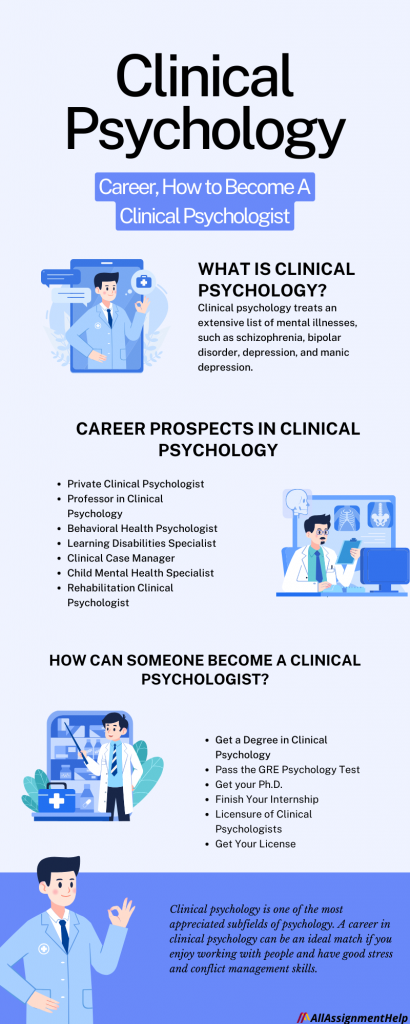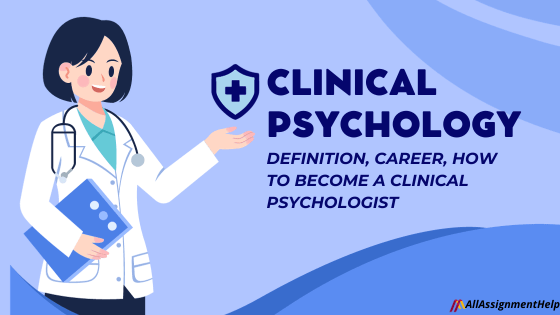Thousands of children and adults suffer from numerous emotional, mental, and behavioral issues, which prevent them from leading happy and regular lives. On average, it typically takes those individuals 11 years to receive treatment after the first indications of a mental illness appear. Thankfully, a field of study is dedicated to understanding the workings of the human mind, both healthy and unhealthy. Clinical psychology is a highly noble profession, but it also demands extensive patience, compassion, willpower, and mental fortitude. Clinical psychologists can assist these people by identifying and treating their illnesses and restoring joy. Therefore, those who want to become a clinical psychologist can find this blog useful. In this blog of All Assignment Help, we will tell you everything about clinical psychology, from definition to career prospects, and how you can become one.
What is Clinical Psychology?
Clinical psychology is a branch of psychology that deals with diagnosing, treating, and evaluating mental health issues. Clinical psychology treats an extensive list of mental illnesses, such as schizophrenia, bipolar disorder, depression, and manic depression. This branch of psychology provides you with the psychological specialty that provides continuing and comprehensive mental and behavioral health care.
Psychologists can only use talk therapy as treatment. Sometimes, psychiatrists and other doctors use medication to treat their patients. To be a clinical psychologist, you may require a higher degree to get expertise in the subject. However, there are short-term courses available online that a student can go for and get a basic knowledge of clinical psychology. For instance, a student can have a certificate or training in a particular type of therapy. However, taking a clinical psychology online course demands a lot of time and patience which sometimes can make the students tired and less interested in the class. But don’t worry as there are multiple online class help services available where you can ask, please do my online psychology class for me. They will assign an expert to take your class and help you complete the courses with an A grade.
Read Here: Different Psychology Courses to Look Out For
How Clinical Psychology Works?
The practical application of research methodology and findings in the diagnosis and treatment of mental diseases is closely linked to numerous important aspects of clinical psychology. Clinical psychology treatment can include the following steps:
- Treatment: Individualized therapy, group therapy, or a mix of the two might be used for treatment. The treatment modality varies from client to client depending on their needs and personalities.
- Evaluation and Screening: This approach involves assessing the client to see what is bothering them to diagnose and create a course of treatment.
- Discharge: When a patient’s treatment is over, they are released from a hospital or other institution if they have chosen to participate in an inpatient program.
A clinical psychologist can utilize many therapy philosophies when dealing with clients. They can use the client’s recorded social interactions, as well as their cognitive and emotional processes to create a diagnosis and therapy plan. However, they don’t write prescriptions for medicines.

Career Prospects in Clinical Psychology
After pursuing higher degrees in Clinical Psychology, you have even more career options. This is the field that is most concerned with the diagnosis and treatment of abnormal behavior and mental illness. Therefore, if you have gained higher degrees in this field of study, you may find it easier to get employment in different areas. Likewise, you can do your own private practice or with some other institution. Notably, the following are the most interesting jobs that scholars in clinical psychology can pursue:
Private Clinical Psychologist
First of all, the chief role of the private clinical psychologist in private firms is to meet one by one with patients. They assess, diagnose, and treat their mental disorders. The clinical psychologist can work from private practice, setting their own hours. Therefore, working with as many as or as few patients as they seek to take on. Many clinical psychologists use cognitive therapy methods in this type of position.
Professor in Clinical Psychology
After having a graduate degree in clinical psychology, some choose to stay in an academic setting. That is by teaching others. Under these circumstances with a master’s degree, it will be easier to find a job in the teaching profession. At the university level and school level as well. As a result, they can teach at the primary level at a high school. Moreover, by earning PhD professionals can add a feather to their cap.
Behavioral Health Psychologist
Behavioral health psychologists usually work with patients in both individual and group settings to assist clients in overcoming behavioral challenges such as addiction. This means that your role should involve teaching your clients coping mechanisms, trigger identification techniques, and general strategies for leading healthier lives. If you have a master’s degree, there are plenty of job options as a behavioral health counselor. However, you might need to face various obstacles during your educational journey in behavioral psychology. You can take online behavioral psychology assignment help from professionals to help you make your journey easier.
Learning Disabilities Specialist
There are even more opportunities for students who pursue clinical psychology. After becoming a clinical psychologist, they may work in elementary or high schools with students who have problems with learning. They help in diagnosing disorders such as ADD and Autism. These are the diseases that affect a student’s ability to learn.
Clinical Case Manager
Being a clinical psychologist by training could lead to a career as a clinical case manager. Although clinical case managers in some job settings might specialize in a particular group (such as clients with eating disorders). In this role, you would most likely be in charge of managing a caseload of clients with highly broad requirements. A bachelor’s degree is sufficient for some clinical case management professions. However, a master’s degree will open up more career options.
Child Mental Health Specialist
If you enjoy working with children and wish to specialize in child development, you can go for it without thinking twice. It will allow you to work with children as a clinical psychologist. Becoming a child mental health specialist is a way to help children. When children have a problem understanding or learning something, they approach the clinical psychologist. Henceforth, they diagnose the mental health issues of children.
Rehabilitation Clinical Psychologist
As you would have gotten a gist of a clinical psychologist’s work profile by reading the information above. Likewise, you read about the clinical psychologist who treats addiction and works in hospitals. Similarly, others work in rehabilitation centers. This position requires you to have a PG in clinical psychology. Besides that, the psychologist will need to work with the groups and with individuals to identify the driving forces behind their addiction.
As a clinical psychologist, you might provide one-on-one counseling to patients, families, or other groups of people. Moreover. those who are interested in working in clinical psychology research may also test different medications and therapy.
Also Read: Child Psychology – A Vital Branch of Psychology
How Can Someone Become a Clinical Psychologist?
It takes both a good academic background and practical experience in the fields of clinical science and psychology to become a licensed clinical psychologist. Before receiving their degree, students interested in a career in clinical psychology must finish an approved curriculum and undergo clinical training. They can also take clinical psychology assignment help online to complete their studies. Here is how one can become a clinical psychologist:
Get a Degree in Clinical Psychology
Obtain a psychology undergraduate degree from a reputable university. On average, you must pass all four of these courses with a grade of “C” or higher:
- Psychopathology or abnormal psychology
- Psychology Research Methods/Experimental Psychology
- Cognitive psychology, learning/memory
- Physiological psychology
- Sensation/Perception
Pass the GRE Psychology Test
Many graduate programs in psychology require passing this standardized test to be admitted. However, certain universities only admit clinical students and applicants who receive scores in the 80th percentile or higher.
Get your Ph.D.
Obtain your PsyD or PhD in clinical psychology from an APA-accredited clinical school. While the options of graduate programs in clinical psychology differ from school to school, you will have the freedom to select a focus area of study according to your preferences. A few possible areas of focus include forensic psychology, family/child and marital dynamics, and health.
Finish Your Internship
Upon completing your Ph.D., you may need to complete supervised clinical hours in certain states to become licensed. Hence, a postdoctoral psychology fellowship must be completed to accomplish this. Countries have different requirements for a given number of hours. To find out what is required in your state, utilize the interactive map provided by the Association of State and Provincial Psychology Boards.
Licensure of Clinical Psychologists
Passing the Examination for Professional Practice in Psychology (EPPP) is the last requirement before becoming licensed. There are 225 multiple-choice questions across eight subject categories on the exam. You have roughly four hours to finish the examination. You need to accurately answer roughly 70% of the questions to pass. Usually, the exam costs $450. However, you can pass the exam with great scores by making a careful lesson plan assignment far before your exam date.
Get Your License
At last, you can apply for a state license after graduating from both your clinical psychology program and the psychology exam. This license attests to your ability to work lawfully as a clinical psychologist in practice and get compensation. However, you will need to get your fingerprints taken as part of the license application procedure.
Clinical psychology is one of the most appreciated subfields of psychology. However, it’s crucial to consider your interests before determining if this is the field for you. A career in clinical psychology can be an ideal match if you enjoy working with people and have good stress and conflict management skills.
FAQs
| What is the salary range for clinical psychologists? According to Payscale in January 2023, clinical psychologists are well-paid with an average annual pay of $85,500. |
| In what ways does clinical psychology help society? Clinical psychology has facilitated research and understanding of severe illnesses in people, which in turn has facilitated the provision of assistance to those in need. |
| How challenging is the path to becoming a clinical psychologist? There are several years of education required, along with a challenging learning curve that combines learning in the classroom with practical practice. However, the benefits are likely to exceed these difficulties if you like being of service to others. |
